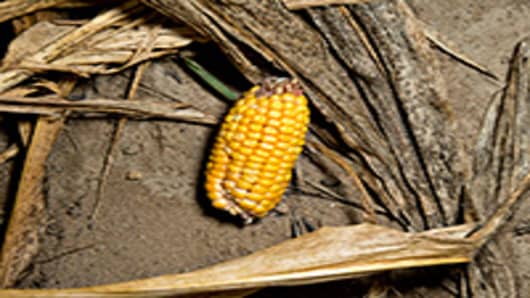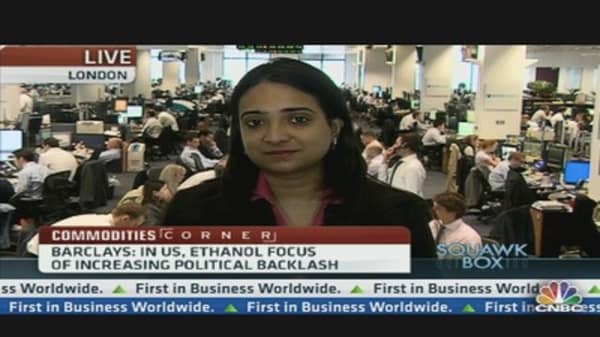As the U.S. drought continues and global grain prices soar, G20 leaders are considering an emergency meeting at the end of August to consider what measures to take to combat the growing food crisis. But the surge in corn, soy and wheat prices could also lead to some benefits for the agricultural sector and an opportunity for investors, according to one fund manager.
Richard Davis, a Portfolio Manager at the BlackRock World Resources Income Fund, told CNBC Europe’s “Squawk Box” that despite predictions from the U.S Department of Agriculture (USDA) that food inflation will accelerate as a result of record crop prices from 3 percent in 2012 to 3.5 percent in 2013, he didn’t believe a significant rise in inflation was on the horizon that would burden companies dealing in agriculture and commodities.
Indeed, Davis said there was an investment opportunity in agriculture as the farming sector regrouped and redoubled its efforts in crop production.
“We expect to see a supply-side response, profitability is obviously very good in farming at the moment with corn around eight dollars so we expect to see a response which will counter that price rise and that’s a long-term trend we expect to see going forward, “ he said.
Corn prices have risen 27 percent to $8.29 a bushel and soybean prices rose 35 percent to record highs of $16.31 a bushel because of a severe drought that has hit the U.S. Midwest.
The USDA warns that prices could rise even further as inventories of corn, wheat, soybeans and rice are predicted to drop 1.8 percent to a five-year low before harvests in 2013.
“Farmers globally will increase their production and that’s where the investment opportunity lies in our view, ” he said, adding, “We invest in companies that provide inputs to farmers, so they provide seeds, fertilizers, chemicals and equipment.”
“We think demand for those types of product is going to be very strong going forward.”
Davis told CNBC that seed producers such as Syngenta and Monsanto, fertilizer companies such as Potash and Agrium and the equipment provider John Deere would do well in the long-term.
The food, seed and industrial sectors are suffering currently as corn supplies dwindle and costs rise. As farmers sell off their livestock as they struggle to feed their animals, President Obama has unveiled plans to buy 170 million dollars of meat entering the food market.
The move is likely to be cold comfort for global commodities markets and the political consequences of the drought are also unpredictable according to Sudakshina Unnikrishnan, commodities analyst at Barclays.
She told CNBC that there could be a “political backlash” before the U.S. elections as different sectors of the agricultural industry place heavy demands on the government, and on corn supplies, to deliver.





